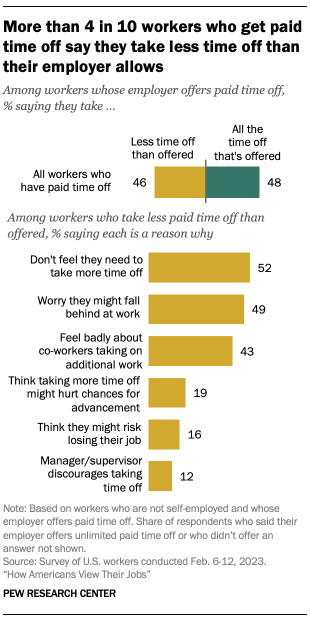Some 46% of U.S. workers who receive paid time off from their employer – whether for vacation, doctor’s appointments or minor illnesses – take less time than they are offered, according to a recent Pew Research Center survey.
Pew Research Center conducted this analysis to look at how workers in the United States use their paid time off benefit. The analysis excludes workers who are self-employed.
For this analysis, we surveyed 5,188 U.S. adults who are working part time or full time, who are not self-employed, and who have only one job or have more than one but consider one to be their primary job.
The data was collected as part of a larger survey of workers conducted Feb. 6-12, 2023. Everyone who took part is a member of the Center’s American Trends Panel (ATP), an online survey panel that is recruited through national, random sampling of residential addresses. Address-based sampling ensures nearly all U.S. adults have a chance of selection. The survey is weighted to be representative of the U.S. adult population by gender, race, ethnicity, partisan affiliation, education and other categories. Read more about the ATP’s methodology.
Read more about the questions used for this analysis and the survey’s methodology.

Upper-income workers are more likely than middle- and lower-income workers to say they take off less time than offered. About half of upper-income workers (51%) say this, compared with 45% of middle-income workers and 41% of lower-income workers.
There are also differences by education level. About half of workers who have a bachelor’s degree or more education (51%) say they take less time off than what is offered, compared with 41% of workers with less education.
Among workers who receive paid time off, there are also differences by pay type, managerial status and industry when it comes to using that benefit:
- Salaried workers are more likely than hourly workers to take less paid time off than their employer offers (52% vs. 39%).
- Managers are more likely than nonmanagers to say they take less time off than available (54% vs. 42%).
- 68% of workers in education and 57% in government, public administration or the military say they take less time off than offered. These are higher than the shares in other industries who say the same.
When workers who don’t take all their time off are asked why, some reasons are more common than others. About half of those who don’t take all their time off (52%) say they don’t feel they need to take more. A similar share (49%) say they’d worry about falling behind at work if they took more time off. Some 43% of workers who don’t take all their time off say they’d feel badly about their co-workers taking on additional work.
Workers’ reasons for not taking more time off also vary by demographic and job characteristics, including race, gender and years with their employer:
- Women are more likely than men to say that feeling badly about co-workers taking on additional work is a reason they take less time off than offered (48% vs. 39%). Women ages 18 to 49 are especially likely to say this, compared with men of the same age group (53% vs. 43%).
- Black workers are more likely than White workers to say that the risk of losing their job is a reason they take less time off than what is offered (21% vs. 13%).
- About a quarter (24%) of workers who have been with their employer for less than a year say that the risk of losing their job is a reason they don’t take more time off. A similar share (21%) of workers who have been with their employer for between one and five years say this. More tenured workers are less likely to say this is a reason they don’t take all their available time off (11% say this).
Note: Here are the questions used for this analysis, along with responses, and the survey methodology.



